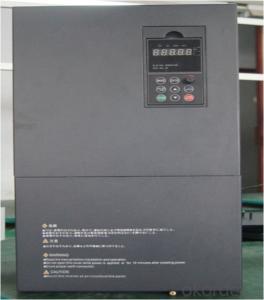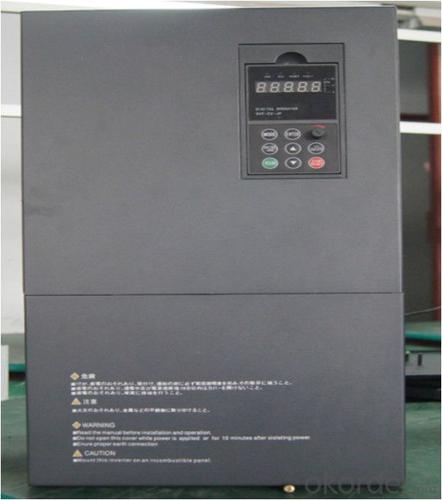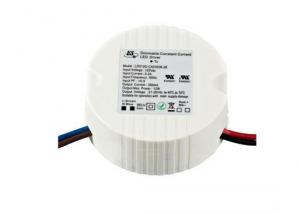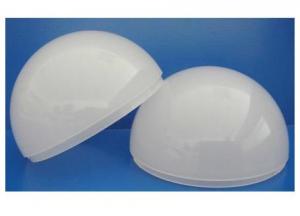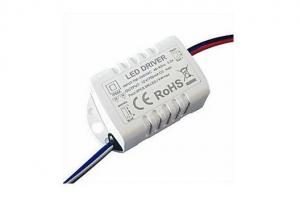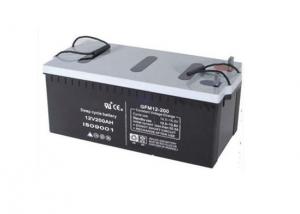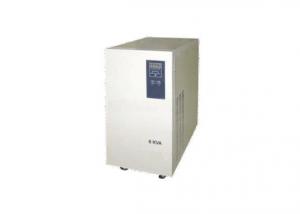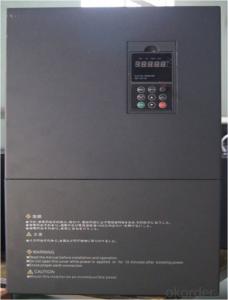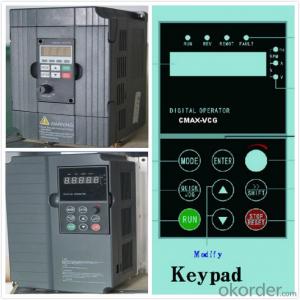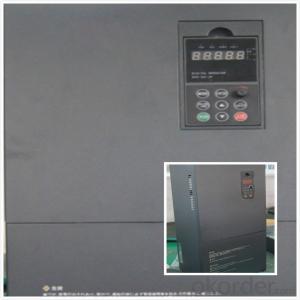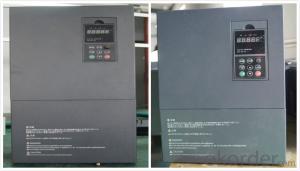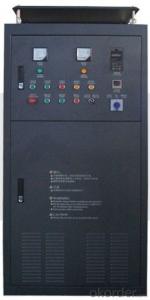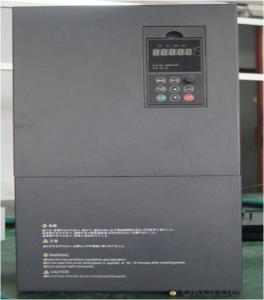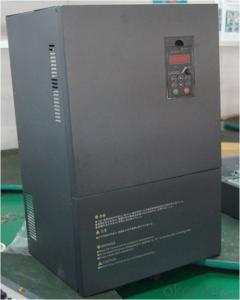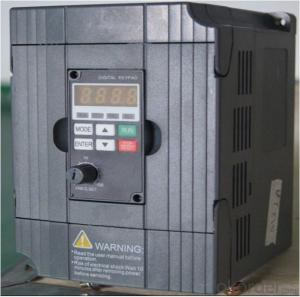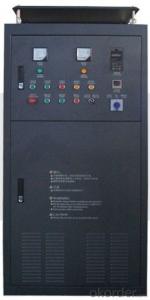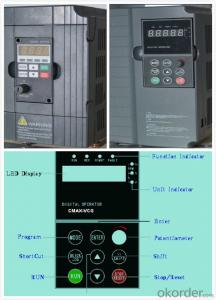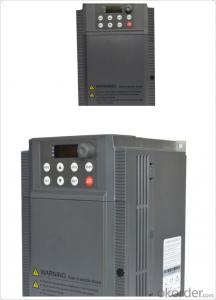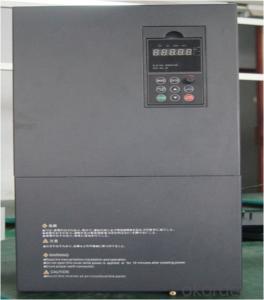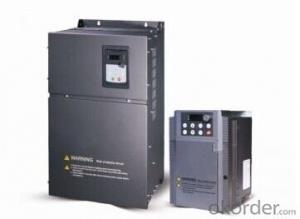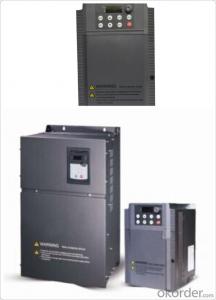China VFD Variable Frequency Drive 3 phase 380V
- Loading Port:
- Tianjin
- Payment Terms:
- TT OR LC
- Min Order Qty:
- 1 pc
- Supply Capability:
- 100000 pc/month
OKorder Service Pledge
OKorder Financial Service
You Might Also Like
Specifications
1.220V Single Phase Variable Frequency Drive 2.2KW
2.Advanced control technology
3.Easy to operate
220V Single Phase Variable Frequency Drive 2.2KW
General
CNBM frequency inverter is a high-quality, multi-function,
low-noise variable frequency drive which is designed, developed and manufactured according to international standards.
It can meet different needs of industrial conditions.
The inverter applies advanced control technology of space voltage vector PWM, with functions of constant voltage control, power-off restart, dead zone compensation, automatic torque compensation, online modification parameter, high-speed impulse input, simple PLC and traverse.
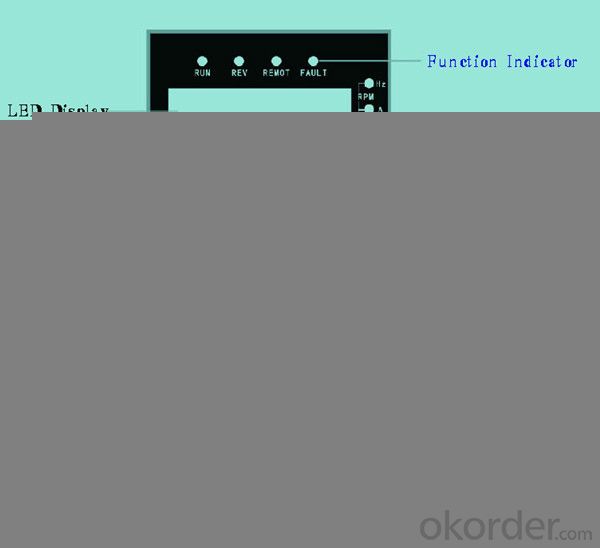
Product Name:CMAX-VCG15/P18.5T3 ~ CMAX-VCG18.5/P22T3
Application
Textile: coarse spinner, spinning frame, wrap-knitting machine, loom, knitting machine, silk-spinning machine, etc.
Plastic: extruder, hauling machine, decorating machine, etc.
Pharmacy: mixer, roaster, etc.
Woodworking: engraving machine, sander, veneer peeling lathe, etc.
Papermaking: single type papermaking machine, etc.
Machine tool: non-core grinding machine, optical lens grinding machine, cutting mill, etc.
Printing: cloth-washing machine, dye vat, etc.
Cement: feeder, air blower, rotary furnace, mixer, crusher, etc
Fan and pump: kinds of fans, blowers and pumps
Specification
Item | Specification | |
Input | Input voltage | 220/380V±15% |
Input frequency | 47~63Hz | |
Output | Output voltage | 0~input voltage |
Output frequency | 0~600Hz | |
Peripheral interface characteristics | Programmable digital input | 4 switch input, 1 high-speed impulse input |
Programmable analog input | AI1: 0~10V input AI2: 0~10V input or 0~20mA input, | |
Programmable open collector output | 2 Output (3.7kW and above: 1 Open collector output) | |
Relay Output | 1 Output (3.7kW and above: 2 Relay output) | |
Analog output | 2 Output, one is 0~10V, another is 0~20mA or 0~10V | |
Keypad | Display:5-digit 8-section LED (Red), 2 indicators; parameter setting: 8 keys (including multi-function hot key ), 1 potentiometer | |
Technical performance characteristics | Control mode | All digital space voltage vector SVPWM algorism |
Overload capacity | G purpose: 150% rated current 60s P purpose: 120% rated current 60s | |
Speed ratio | 1: 100 | |
Carrier frequency | 1.0~10.0kHz | |
Torque compensation | Linear, multi-point, 1.3th power, 1.7th power, 2.0th power reduced torque; Compensation voltage range: automatic compensation and manual compensation 0.1~10% | |
Automatic voltage adjustment | It can automatically maintain output voltage constant when grid voltage fluctuates. | |
Automatic current adjustment | When the current is over current limit, under clocking automatically limits output current. | |
Function characteristics | Frequency setting mode | Keypad digital analog input, keypad potentiometer, impulse frequency, communication, multi-step speed and simple PLC, PID setting and so on, switch-over of setting modes. |
Simple PLC, multi-step speed control | 16-step speed control | |
Special function | Traverse control, length control, time control | |
QUICK/JOG key | User-defined multi-function hot key | |
Protection function | Over-current, Over voltage, under-voltage, over-heat, phase failure, over-load and motor over-load | |
Working condition | Installation site | Indoor, altitude of less than 1km, dust free, non-corrosive gases, no direct sunlight |
Application environment | -10°C~+40°C, 20~90%RH (no dew) | |
Vibration | Less than 0.5g | |
Storage temperature | -25°C~+65°C | |
Installation type | Wall-mounted type, floor cabinet type | |
Cooling mode | Air-forced cooling | |
- Q: When the inverter is running at full 50HZ, the output voltage decreases and the output current becomes smaller. What is the reason?
- If the load of the motor is increased, the slip S is increased, the electromotive force of the motor is decreased, and the electric current of the motor will become larger. That is to say, when the motor is running in the overclocking stage, the load of the motor is light, the current will become smaller, and the current will not be smaller if the load is negative. Didn't I make myself clear?
- Q: What is the difference between frequency converter and servo driver?
- The general use of the situation, such as high-speed, high-precision positioning equipment, servo, high power speed control using frequency conversion.Like the central air conditioning system, elevators and so on, many places use frequency conversion; like the textile machine, the placement machine, the plug-in machine uses the servo. In fact, many cases are used in conjunction with the two systems, according to the needs of the design arrangements.
- Q: How can I learn the converter well?
- 1. overload or acceleration and deceleration in case of braking resistance to increase, to help the loss of mechanical energy, you may have to set the corresponding parameters. 2. inverter motor with a little weak, if there is an advanced mode (magnetic flux vector control and the like), enable this function can play a maximum motor ability (the specific reference manual, cheap converter is not it) 3. serial communication change frequency, need to understand the communication protocol converter, usually have instructions to write specific parameters of frequency message reference manual.
- Q: Today, I was asked the question, and I also brought it to you to share the following Oh!
- The frequency of the electricity we use everyday is 50Hz. If we want to change the frequency, we have to change it through the frequency converter.The working principle of frequency converter is to change the frequency alternating current into no frequency direct current, and then control it by electronic circuit so that it can adjust its frequency alternating current at any time.The inverter is similar to the back half of the inverter, which converts the direct current into alternating current.
- Q: What does "EPCU" mean in a frequency converter?
- But look at your inverter has also been used for some time, if not before, and now appear, it is estimated that the hardware is broken, and manufacturers communicate maintenance!
- Q: What is a frequency converter?
- The frequency converter is the electric energy control device that transforms the power frequency power to another frequency by the on-off function of the power semiconductor device. The frequency converter is mainly composed of rectifier (AC DC converter), filter, inverter (DC AC converter), brake unit, drive unit, detection unit, micro processing unit and so on.
- Q: What are the parameters of the frequency converter? Thank you
- Some are called bias frequency or frequency offset settings. Its purpose is that when the frequency of external analog signals (voltage or current) to set, you can use this function to adjust the frequency setting signal, minimum output frequency, as shown in figure 1. Some of the inverter when the frequency setting signal is 0%, the error values in the range of 0 ~ Fmax, some converter (such as electricity forhomes Sanken) can also bias polarity settings. For example, in debugging, when the frequency setting signal is 0%, the output frequency of the inverter is not 0Hz, and xHz, then the bias frequency is set to negative xHz, so that the output frequency of the inverter is 0HzI
- Q: How do two inverters synchronize?
- First of all, to determine whether the speed of the two conveyor is very strict (there is strict relative position requirements), if not, can use the following program:1. use a double potentiometer to tune two inverters simultaneously, one with a potentiometer to adjust the ratio between the two.
- Q: 5.5KW frequency converter with 4.5KW deep water pump, pressure regulator by conveying signal to frequency converter start normal, the pressure to reduce the frequency converter after the start, to about 30Hz in order to maintain the pressure about shocks, 30 seconds inverter over-current alarm. Can it be the fault of the frequency converter? How should I check it?
- overloadOverload faults include frequency overload and motor overload. It may be caused by the acceleration time is too short, the network voltage is too low and the load is too heavy. Generally by extending the acceleration time, extending the braking time, check the power grid voltage. Overload, the selected motor and inverter can not drag the load, or it may be caused by poor mechanical lubrication. Such as the former, you must replace the high-power motor and inverter; if the latter is to overhaul the production machinery.
- Q: How to choose frequency converter?
- 3. when the load is large, the braking unit and the braking resistor should be selected simultaneously.4. check the motor nameplate current rating (no nameplate rated current). The rated current of the inverter is greater than the maximum running current of the motor
Send your message to us
China VFD Variable Frequency Drive 3 phase 380V
- Loading Port:
- Tianjin
- Payment Terms:
- TT OR LC
- Min Order Qty:
- 1 pc
- Supply Capability:
- 100000 pc/month
OKorder Service Pledge
OKorder Financial Service
Similar products
Hot products
Hot Searches
